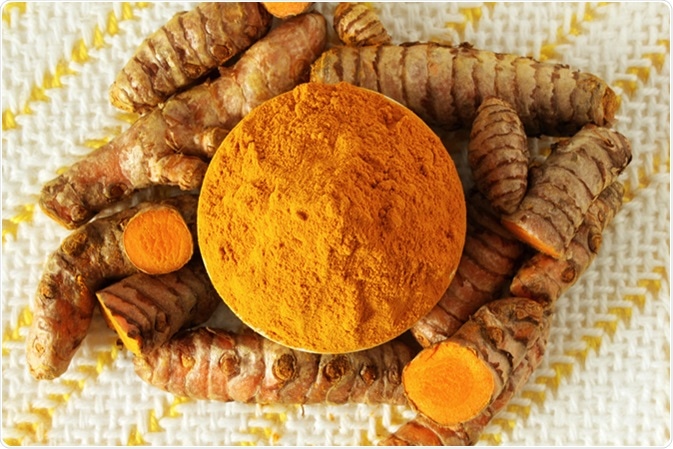Aggressive prostate cancer cannot be treated effectively by current medical or surgical therapies of radical prostatectomy, chemotherapy, radiotherapy, or androgen deprivation therapy.
Hormone-dependent prostate cancer responds well to androgen deprivation. In aggressive cancer, however, this therapy is actually counterproductive as it exerts positive selection pressure on the clones of androgen-independent cells, promoting their survival and metastasis.
Thus, new approaches must be used to treat tumors that are hormone-independent or to prevent hormone-sensitive tumors from transforming into hormone-refractory ones. The slow pace at which malignant transformation of healthy prostatic tissue occurs makes primary prevention an important strategy in prostate cancer eradication.
What is curcumin?
Curcumin is a plant polyphenol found in spices like turmeric, which are used in Asian cuisine as well as an anti-inflammatory and cleansing agent. Some studies show that the compound called curcumin diferuloyl methane can block certain chemical pathways that stimulate bone cells to form secondary cancer deposits in hormone-refractory prostate cancers.

Turmeric root powder and root. Curcumin is chemical produced by some plants. It is the principal curcuminoid of turmeric. Image Credit: By Govindji / Shutterstock
How does curcumin act?
The mechanism of action of curcumin in prostate cancer is manifold. One mechanism if inhibition of cell signaling pathways. Preliminary laboratory studies point to some possible mechanisms by which curcumin may affect prostate cancer.
Interplay of TGF-β and BMP-7
TGF-β (transforming growth factor-β) decreases E-Cadherin in the tumor cells and promotes de-differentiation, which causes the epithelial-mesenchymal transition (EMT) to invasive and metastatic prostate cancer. However, if BMP-7 interacts with TGF-β, E-Cadherin expression is increased to promote differentiation and inhibit tumor growth. Curcumin has been shown to upregulate BMP-7.
PPAR-γ upregulation
Curcumin is an anti-inflammatory molecule that upregulates peroxisome proliferator activated receptor-γ (PPAR-γ), which promotes BMP-7 expression. Thus, it may also interrupt the effects of TGF-β.
Wnt inhibition
Curcumin can also suppress or reduce signaling by Wnt pathways. It also reduces the bone formative activity of prostate cancer cells. This may be explained by its activation of the PPAR-γ pathway, which blocks the communication between signaling pathways that promote bone synthesis and those involving TGF-β.
Brown adipose tissue formation
Increased levels of BMP-7 also stimulate the formation of brown adipose tissue (brown fat, a special form of fat cell), which prevents the proliferation of tumor cells. Activation of the Wnt pathway promotes differentiation into osteoblasts, but also prevents fat cell formation. On the other hand, the PPAR-γ pathway promotes BMP-7 expression and therefore brown fat formation, while repressing osteoblast synthesis. Curcumin thus shifts the differentiation pathway towards brown fat.
Curcumin also reduces pro-inflammatory adipokine expression, driving down levels of tumor necrosis factor-α (TNF-α), and monocyte chemoattractant protein (MCP-1), but activating the anti-inflammatory adipokine called adiponectin. Thus it prevents white fat synthesis while promoting anti-oxidant activity within fatty tissue.
Changing the environment
The changing environment of fat cell differentiation can restrict metastatic prostate cancer cells to interrupt interactions with osteoblasts and osteoclasts at bony metastatic sites.
Curcumin also suppresses the release of parathyroid hormone-related protein (PTHrP), a molecule that promotes osteolysis mediated by TGF-β.
Role of curcumin in the chemoprevention of prostate cancer
Curcumin has been shown to have antiproliferative, antioxidant, and anti-carcinogenic effects. Curcumin reduces the expression of androgen receptors and also inhibits binding of androgen receptors to the prostate-specific antigen (PSA) gene to decrease PSA expression in hormone-dependent cells. This could inhibit tumor progression to hormone-independent status.
Curcumin may also suppress a homeobox gene of the NK class that is involved in both normal and tumorous prostate growth.
Curcumin also inhibits EGFR signals, such as HER2, which mediate tumor cell proliferation and the expression of aggressive phenotypes. It can also inhibit cyclins involved in the cell cycle, which mediate prostate cancer cell proliferation. This could arrest tumor growth and promote apoptosis, stopping the cell cycle in G2/M phase.
Curcumin also targets cancer stem cells which are responsible for the initial growth of the tumor and for treatment failure. Additionally, it acts against miRNAs which target both the tumor suppressor genes and oncogenes, preventing tumor initiation.
Curcumin suppresses NF-κB expression by preventing IκBα phosphorylation and it suppresses phosphorylated Akt kinase in prostate cancer cells. Akt is a central molecule in tumor formation, where it is often constitutively activated, and the inhibition of these factors causes the downregulation of anti-apoptotic Bcl-2 proteins, promoting apoptosis.
Curcumin also prevents angiogenesis, which normally occurs in response to vascular endothelial growth factor secretion and encourages tumor metastasis.
Prevention of prostate cancer metastasis
Curcumin reduces the expression of some matrix metalloproteinases (MMPs) which are important in facilitating tumor invasion and spread.
Curcumin also suppresses the crosstalk between prostate cancer cells and surrounding stromal or osteoblasts in bone to prevent metastasis.
Curcumin promotes apoptosis of the prostate cancer cells both through the mitochondrial and the receptor-mediated pathways. This makes TNFα- related apoptosis-inducing ligand (TRAIL) an attractive choice for immunotherapy for advanced cancers, that is, in both hormone-dependent and refractory prostate cancers. Curcumin sensitizes the cancer cells to the activity of TRAIL and thus induces apoptosis.
Since it might be capable of arresting osteolysis in metastatic bone lesions of prostate cancer, it could be used alone or as an adjuvant with bisphosphonates in order to prevent bone loss, thus reducing the dose of the latter and thereby the incidence of complications like osteonecrosis of the jaw. Secondly, curcumin could be combined with other activators of the PPAR-γ pathway to increase BMP-7 levels.
Summary
Curcumin has multiple modes of action that may be useful in the development of prostate cancer treatments. However, more work is needed to improve the absorption and slow the metabolism of curcumin to improve bioavailability.
Further Reading
Last Updated: Mar 21, 2019